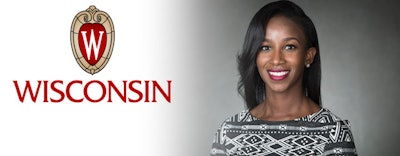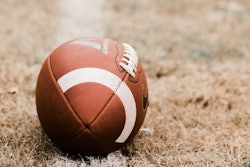
This article appeared in the November | December issue of Athletic Business. Athletic Business is a free magazine for professionals in the athletic, fitness and recreation industry. Click here to subscribe.
Within her first week on the University of Wisconsin campus, Jennifer Hunter was asked in casual conversation if she plays a sport for the Badgers. The 33-year-old took it as a form of compliment on some level, but it's the exact sort of stereotyping that Hunter was hired this summer to address as the UW athletic department's first-ever director of diversity and inclusion. The need for such a hire was affirmed shortly after the official announcement in September, as Facebook commenters insinuated that she got the job based on her skin color. Senior editor Paul Steinbach asked Hunter, a juris doctor (sports law concentration) who came to the UW via Cal athletics and the NBA, to share her perspective on the student-athlete experience.
Why the need for a director of diversity and inclusion?
At a lot of universities with high rigor, you see pushback toward student-athletes within the academic community. It really makes it very difficult for those students to fully develop as young men and women. It's multifunctional. There's a student function — making sure our students are okay. And then also a human resources side — helping make sure we have better practices in our hiring process by reaching out to more-diverse applicant pools.
What are some examples of pushback toward student-athletes?
You always have those dreaded group assignments that are required in order to pass your class, and kids aren't welcomed into those study groups — normal experiences for the rest of us — because they're student-athletes. There's the assumption that they're just here for sport, when they are people who see their lives beyond the game. Or our football players will walk down the street at night, and people cross the street. On Saturday you're a god, and then Sunday night you're a goon. For a kid of 18, 19, 20, that's a hard thing to process, and it's hard for them to reconcile. So part of my job is trying to bridge some of those gaps.
Why is a position like yours so rare in Division I athletics?
It's tough to recognize what your students are going through, and it makes people uncomfortable. And this is not just from a race perceptive. You have LGBTQ students who are in a transition period in their lives — young men and women, some just coming out for the first time. Do we have resources for them? Athletics are generally a very hetero-driven industry. We like to think that there's a lot of inclusion, but we're just getting there. That's a process of having these conversations. The reality is you can't continue to let students who are not in the majority sit in discomfort. We need to make sure that there are programs and policies in place for them to feel comfortable. So you're going to see more of it.
How would you respond to any pushback directed at these types of efforts?
I think that it's a respectable place to be when you can recognize that there are shortcomings in the system that need to be addressed. People really never want to do that around race, gender, sexuality, socioeconomics. It's a touchy subject, and you don't necessarily want to disenfranchise your constituents — your ticket-holders, etc. But at the same time, our department is in the business of developing our young men and women, and after these four or five years they need to be able to leave whole and complete. If that means we have to address some difficult things in order to make sure that their matriculation here is strong and good and that they leave here with a great experience, then that's what we're going to do.
Did the Facebook comments bother you?
It didn't bother me personally, because I expected the backlash. But it was the irony of it, right? This is the reason why I'm here in the first place.
As of this writing, 108 Division I schools had signed the NCAA's new diversity pledge, including only six of 14 schools in the Big Ten. Will you advocate that Wisconsin sign?
Oh, absolutely. I think that that's something that we all recognize is of importance. The thing about Wisconsin — and other places, too — if you look at our upper management, a lot of our people have been with this department for a very long time. It's kind of hard to say that we aren't recruiting certain people for certain positions if the positions don't exist. That's a reality.
Do you side with those who have advocated that the NCAA adopt a version of the NFL's Rooney Rule?
I always like to go to intent versus impact. I think the intent of the Rooney Rule came from a good place. The rule is used, but the results don't match up. We want to have a more diverse applicant pool, but then you run the risk of people feeling as if the person hired didn't earn the position. He or she has to be qualified. It doesn't make sense to me to put a person of color in an applicant pool who is not qualified, but it's also hard for me to believe that you can't find people of color who are qualified. There are qualified people of color. There are people who genuinely earn their job. I've worked very hard in my life. I study hard. I read. I feel like I've earned everything that I have. Representation does matter. I know that it's something that makes people uncomfortable to think about, but one of the first things a student told me was that having someone that looks like her meant a lot to her.
Do you wish a position like yours wasn't necessary?
Absolutely. Not just for me and my students, but for my child. My kid's only nine. She's going to come up and she's going to go to college one day and she's going to be out in the world. And I love how she is right now, with this complete innocence. My kid has no idea of any of the things that are going on in the world. If you told me 10 years ago that I would be sitting in this role, I never would have thought I'd be living in the racial climate that we're in today. I never thought I would be experiencing what we're experiencing right now. And it's devastating to me as a person of color and as a parent.
This article originally appeared in the November | December 2016 issue of Athletic Business with the title "One On One: 'On Saturday you're a god, and then Sunday night you're a goon.'"





































